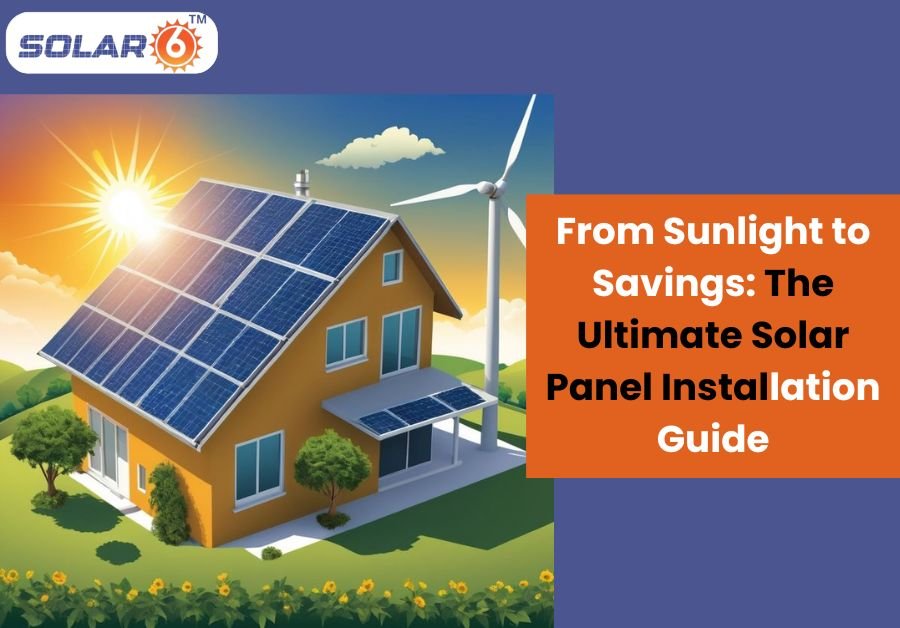In today’s global world, where energy prices are climbing and environmental concerns are more pressing than ever, the demand for solar panel installation has skyrocketed. Across homes, organizations, and industries, people are turning to solar energy as a reliable, value-powerful, and eco-friendly solution. Whether it’s a residential rooftop system that powers a family home or a big-scale commercial solar setup that runs an entire factory, solar energy has turned out to be a transformative technology that offers each financial and environmental benefits.
In this Guide, Solar6 will take you step-by-step through the whole lot you need to know approximately solar panel installation—from knowing how it works to calculating the financial savings, choosing the proper device, taking advantage of government subsidies, and maintaining it for long-term performance. By the quit, you’ll understand why rooftop solar is one of the smartest investments for a sustainable destiny.
1. Why Solar Panel Installation Is Booming in 2025
The worldwide shift closer to renewable energy is accelerating, and solar electricity is the main source. In 2025, technological advancements have made solar panels less costly, greater efficient, and simpler to install. With rising power charges and climate change worries, families and corporations are looking for power independence through solar power systems.
Key factors driving this boom include:
- Falling equipment costs due to mass production and improved manufacturing.
- Government subsidies and tax incentives for residential and commercial solar installations.
- Net metering policies allow you to sell excess electricity back to the grid.
- Increased awareness of the environmental impact of fossil fuels.
2. How Solar Panel Installation Works
A solar panel system works by way of converting sunlight into energy through photovoltaic (PV) cells. These cells generate direct cutting-edge (DC), which is converted into alternating cutting-edge (AC) using an inverter, making it usable for your own home or commercial enterprise.
The main additives of a solar power device consist of:
- Solar panels (PV modules)
- Inverter (string inverter, microinverter, or hybrid)
- Mounting structure for rooftop or ground installation
- Battery storage (elective, for backup electricity)
- Wiring and protection gadgets
When connected to the grid, excess power may be dispatched back to the software organization in exchange for credits—a technique called net metering.
3. Types of Solar Panel Installation
A. Residential Solar Installation
Designed for houses, residential solar panels are typically set up on rooftops and sized to meet household energy needs. They assist house owners reduce power bills by up to 70–90% and growth property taxes.
B. Commercial Solar Installation
Commercial sun systems are larger in scale and designed for workplaces, factories, branch shops, colleges, and hospitals. They can generate giant monetary savings for organizations and assist in meeting organizational sustainability goals.
C. Industrial and Utility-Scale Solar
These are massive installations designed to energy whole groups or commercial operations, regularly installed on huge plots of land.
4. Step-by-Step Solar Panel Installation Process
Step 1: Site Survey & Energy Audit
A professional solar installer conducts a site survey to assess sunlight exposure, roof strength, and energy consumption patterns.
Step 2: System Design & Proposal
The installer designs a customized solar power system based on your electricity usage, budget, and roof space.
Step 3: Permits & Approvals
Applications for government subsidies, net metering, and electrical permits are processed.
Step 4: Installation
Technicians mount solar panels, connect wiring, and install the inverter.
Step 5: Testing & Commissioning
The system is tested for safety and efficiency before it’s connected to the grid.
5. Cost of Solar Panel Installation in 2025
The cost of solar panel installation depends on factors like system size, panel type, inverter quality, and battery storage. In India, for example:
Residential solar (3–5 kW): ₹1.5–3 lakh after subsidies.
Commercial solar (10–100 kW): ₹7–40 lakh.
With government subsidies covering up to 40% of installation costs for residential systems, the return on investment (ROI) period can be as short as 3–5 years.
6. Government Subsidies and Incentives
Many state governments provide beneficial incentives to promote solar power installation.
These subsidies not only make solar panel installation less costly but also accelerate the shift to renewable energy.
7. Benefits of Solar Panel Installation
- Significant Cost Savings – Cut electricity bills with the aid of up to 80%.
- Energy Independence – Reduce reliance on application companies.
- Environmental Impact – Zero emissions and reduced carbon footprint.
- Property Value Boost – Homes with solar panels promote faster and at better costs.
- Low Maintenance – Minimal protection required, with a lifespan of 25 years.
8. Maintenance and Care for Long-Term Performance
While solar panels require little upkeep, regular cleansing and inspections help ensure maximum performance. Dust, particles, and foul droppings can reduce power output. Most systems handiest need annual servicing.
9. The Future of Solar Panel Installation
With ongoing improvements like bifacial solar panels, sun tiles, and AI-powered energy control, solar power will become even greener and less costly in the coming years.
By 2030, professionals expect that rooftop solar could be a fashionable feature in most city houses and groups.
Conclusion
From cutting energy prices to contributing to a cleaner planet, solar panel installation offers unmatched benefits for both homes and companies. Whether you’re putting in a small residential solar panel or a large industrial solar energy plant, the financial savings, reliability, and sustainability make it one of the smartest investments of our time. With government subsidies, Net metering, and a superior era, now could be the appropriate time to switch from daylight to standard time. Solar6 provides India’s best solar panels. For more details, contact us: 9052144777

